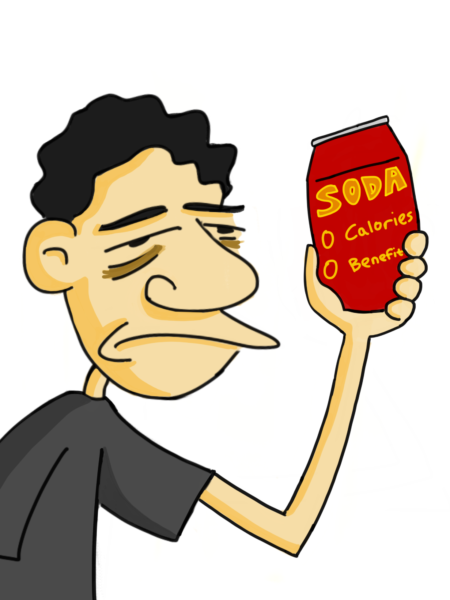Imagine this: It’s 5th period, and you’re feeling that out of nowhere hunger in the middle of your English class. So, you head down the hall to the vending machines during your break, There’s a colorful array of zero-calorie sodas, and “50% less fat” Baked Cheetos greet you. But, one thing is missing: calories! When discussing food, we generally focus on how it impacts a person’s physical health, but we never talk about the effect it has on the brain. Food is a necessity for healthy brain function and, when a person is malnourished, their emotional regulation, decision-making skills, and overall processing are depleted. So, why are most of the food options the school provides students with so low in calories and nutrients?
According to HealthyChildren.org, the daily recommendation of calories for the average teenager should be around 2,200-2,800 a day. We spend seven hours each day at school, which means students consume lunch and maybe a snack or two while in the building.
As someone in recovery who has struggled with an eating disorder, my vending machine and cafeteria experiences have often been difficult. It was hard to recover responsibly when the options had few calories. I noticed more of my friends habitually checked every item’s calories before eating. And I have noticed I feel hungrier sooner if I eat baked Cheetos over regular. A Harvard Health study says, “Like an expensive car, your brain functions best when it gets only premium fuel. Eating high-quality foods that contain lots of vitamins, minerals, and antioxidants nourishes the brain and protects it.” There has been a significant difference in my grades and learning when I eat a well-balanced and high-energy meal or snack before and at school. I always have a fulfilling lunch, especially before tests and shows, before I go up and perform. Your cognitive abilities can suffer significantly if you are not eating enough calories during the school day. This will decrease test performance, how you take in new information in classes and overall focus. You don’t want to leave class not knowing what you just learned because you didn’t get enough to eat. “Food is the fuel necessary to get through a normal day. Calories in food provide energy to carry out regular day-to-day activities. Without an adequate amount of this energy, students may fall asleep in school or lack the energy to pay attention to an entire day of classes,” according to borgenproject.org.

But it’s not just the vending machines that are the problem. Although schools must promote healthy eating habits, they should be aware of its presentation. Focusing on “good” foods and “bad” foods can lead to toxic relationships with food. And nobody wants to be in a toxic relationship. During freshman year, I was in the nurse’s office. This was around the time I was pretty deep into my eating disorder. I will never forget what I saw while waiting to see the nurse. A poster that showed how many miles needed to run to burn off what looked like a handful of baby carrots. I was upset with that poster for my mental health and how harmful that could be for someone with an unhealthy relationship with food. The focus on weight loss can play a huge role in body image issues and even disordered eating for students.
Diet culture is everywhere. It’s Inevitable, especially in today’s society. But it’s certainly not new. It’s in our very school. Diet culture can be traced back to as early as ancient Greece. The Social and Health Research Center says, “The first ideas of being “fit” and “healthy” originated in Greece…It wasn’t until 1825 that the first low-carb diet came onto the scene.”
Interestingly, the Greeks were solely focused on the physical abilities one had for sport (hence the Olympics) rather than the appearance of one’s body. Fast forward to the mid-1800s, when body image became more prevalent. The “definition of Beauty” was based on one’s physical appearance. That’s when diet culture took a turn for the worse. Today, diet culture is a mess of different things, from TikTok “doctors” telling us to eat mustard and celery sticks to the hundreds of diets I can’t pronounce.
I have struggled with Anorexia Nervosa since around third grade. It was only until freshman year that the issue was addressed and I was diagnosed. The obsession with weight loss and eating disorders is complex. It affected everything in my life—from how I act, to how I dress and how I interact with others. My relationships were significantly impacted, as well as my academics, because I was so hyperfocused on my weight. And the only thing I could ever think about was food. If ETHS even makes the simple change of adding more brain-fueling food options and including positive talk about food and nutrition, that small change can make a huge difference in how students view food, their bodies and themselves.

















Sue Gass • Oct 4, 2023 at 12:41 pm
Fabulous and courageous article. This so desperately needs to be addressed at ETHS. Not only from the vending machine offereings, but also from how nutrition is taught and presented in the Wellness classes, where so much of the information presented was wrong and frankly dangerous. Thank you for shining a bright light on this issue and for your bravery in sharing your struggles.